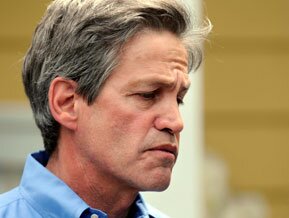
Minnesota (www.Bartamaha.com) Norm Coleman’s decision to pass on a campaign for governor in Minnesota has removed a looming shadow from the contest and essentially narrowed the GOP nomination fight to a two-man race, according to Republicans in the state.
Republican political operatives said Coleman’s conclusion helped bring much-needed clarity to a crowded field and narrowed the focus to the two top candidates, former state House Minority Leader Marty Seifert and state Rep. Tom Emmer.
“I think it gets everyone to the point where the field is set, now you know the game being played, so picking teams will be accelerated,†said Dave FitzSimmons, Emmer’s campaign manager.
Although there are seven announced Republicans, a straw poll taken at the state GOP convention in October had Seifert leading Emmer 37 percent to 23 percent.
About 2,000 delegates will decide the Republican nominee for governor through a caucus process that begins Feb. 2 and culminates at the state convention in May.
Capturing a major slice of Coleman’s supporters will be a key next phase of the campaign — and the courting of the former U.S. senator by both camps has already begun.
“He’s — if not the most important — one of the most important delegates out there,†said Emmer, who noted he had already spoken with Coleman and asked for his support. “Norm’s got a lot of friends out there, and he should,†he added.
Seifert said he left Coleman a voice mail late Sunday night. “I see myself benefiting, but there’s no monolith to where his voters will go,†Seifert said.
“I think certainly it brings clarity. We’ll be reaching out. But this race is now down to me and a couple other legislators, so the marketplace works,†he added.
Sarah Janecek, publisher of Politics in Minnesota, said observers are already attempting to forecast Coleman’s future role. “I think the impact Coleman could have is if he endorses in this race,†said Janecek. “But it’s very difficult to gauge what kind of support Coleman had because there was no organization; there was no campaign.â€
Coleman has given no indication about an endorsement.
In a statement first issued to KSTP-TV, the former senator, who is now infamous for his loss of a drawn-out recount last year, said, “This is not the right time for me and my family to conduct a campaign for governor.â€
Coleman’s decision found another Republican regretting her move to drop out of the race just a week ago.
Former state Auditor Pat Anderson told POLITICO she would have continued her campaign for governor had Coleman made his decision two months ago.
“Like everyone in Minnesota, I’m surprised he’s not running,†Anderson said in an interview. “I wish he would’ve done it earlier. I would have stayed in the race.â€
Last Tuesday, Anderson scrapped her campaign, citing uncertainty about the shape of the GOP field and frustration with Coleman’s undecided status, which had frozen the primary in place as Republicans awaited his decision. She instead announced she’d run again for state auditor, a post she lost in 2006 to Democrat Rebecca Otto.
Anderson said she decided to swap races at the beginning of the year because of the state’s stringent campaign finance restrictions, which include varying spending limits, depending on the statewide office.
“Any money I would’ve spent in the governor’s race would have counted against me in an auditor race, if I decided to do it later,†Anderson said. “So I had to make the switch at the beginning of the year.â€
Anderson, whose supporters are likely to line up with Emmer’s more fiscally conservative message, said Coleman’s entry into the race would have hurt Seifert most.
“The winner of this is Seifert. If Coleman would’ve gotten in, he would’ve hurt Seifert. A lot of Seifert people were Coleman people,†Anderson said. “But a lot of my supporters have Tom as their second choice, so my getting out of the race helped Tom dramatically. It’s really a two-man race now.â€
On the Democratic-Farmer-Labor side, the list of candidates is longer, and the race remains fluid. It has been 20 years since the DFL Party last held the governor’s mansion. This cycle’s field includes former U.S. Sen. Mark Dayton, state House Speaker Margaret Anderson Kelliher and Minneapolis Mayor R.T. Rybak, as well as eight other candidates.
“This is really one of those cases where it’ll play itself out. There’s no way to figure out a front-runner,†said progressive activist Denise Cardinal of the Alliance for a Better Minnesota.
But Cardinal predicted that Coleman’s decision against a run will guarantee a more conservative GOP nominee.
“You’ll have a Republican that is all guns and no butter. You’ll have a Republican that’s more conservative than Minnesota is used to,†said Cardinal.
State DFL Party Chairman Brian Melendez agreed that Coleman’s absence would push the eventual nominee to the right.
“The people left in the field are staunch conservatives. We’re going to get a hard-core right winger, and I’d put Seifert and Emmer in that category,†Melendez said.
For DFL-ers, there would have been both positives and pitfalls to running another statewide race against Coleman. Their playbook on Coleman is up to date and well-defined, but he is also one of the few Republicans who can boast statewide name recognition.
“I think it makes life a little easier for us,†said Melendez. “He leaves the Republicans with a really weak bench.â€
Source: Politico.com






